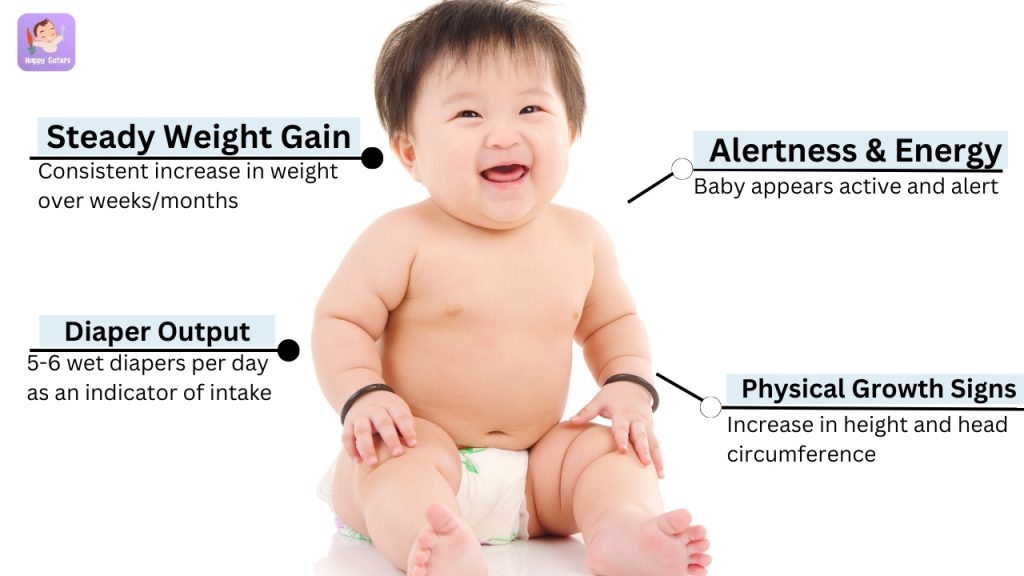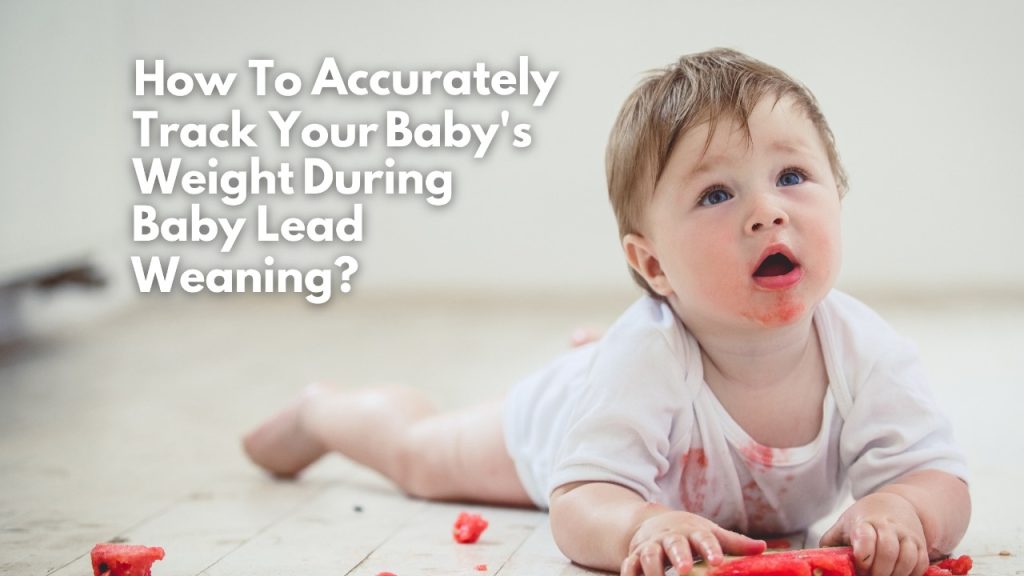Baby-led weaning means letting your baby self-feed finger foods. Although your baby will gain weight adequately with BLW, tracking their weight will help you be at ease. While every baby gains differently, seeing the overall pattern over weeks and months helps spot issues early, if any.
When babies have consistent weight gain, it indicates the baby is taking enough calories from solids and milk. Your baby’s growth curves should go up over time. If you notice unusual slowing or drops on the scale, contact your paediatrician. Let’s see how to track your baby’s weight gain during BLW and how to know if its normal or not.
Why Weight Tracking Matters During BLW?
Monitoring your baby’s weight gain is important when you start solid foods as you know that your baby’s intake is adequate. BLW babies may gain weight slower at first compared to babies who are traditionally fed. This is because, in traditional weaning, the baby is spoonfed purees (or any food) and they don’t have a say in when they are full. It may lead to quicker weight gain.
With BLW, the baby is in control of their food portions, which means they stop when they feel full. Hence, they gain weight slowly, but rest assured that your baby is going to intake the nutrients and calories they require either way.
Also Read :- Baby-Led Weaning Myths
Another reason to track your baby’s weight during BLW is to ensure your baby adjusts well with solids. Tracking weight enables you to see changes after you introduce new foods. It helps you know if the quantity of the food and the textures work for them.
Watching weight also lets you monitor your baby’s growth pattern. All babies gain weight differently based on several factors. With a growth and weight tracking system, you can make feeding adjustments if needed.
To monitor your baby’s weight, you can use a baby scale and track estimates, not precise amounts. Remember that a general weight trajectory matters more than small fluctuations.
Choosing the Right Time to Weigh Your Baby
Tracking your baby’s weight at a consistent time at regular intervals matters a lot. This will help you recognise patterns and monitor weight gain precisely. Follow these steps to get a fair idea of your baby’s weight progress.
- Weigh after the morning diaper change, before breastfeeding or solids. This will give you an idea of their weight at their emptiest stomach.
2. Avoid weighing right after a mealtime since food weight can skew the number.
3. Once a week is enough to see your baby’s weight growth pattern.
The time you choose ensures you get the best read possible. Seeing an accurate curve over weeks, not day-by-day gives you your baby’s growth line. You can check with your paediatrician if you ever feel concerned. Otherwise, enjoy this special time of development by watching your baby flourish.

What’s Normal Weight Gain in BLW?
Once you start solid foods around 6 months, watch how your baby’s weight progresses. Their gaining pace changes as they learn to adjust with new textures and feed themselves. For eg. your baby may like eating finger foods but not mashed foods or vice versa. Ensure that their weight moves upward over time. Babies tend to gain weight differently, from week to week and from season to season, so focus on trends not strict numbers.
Expect your BLW baby to gain around 0.11 to 0.20 kg per week typically. One week your baby may show a big jump as they adjust to changes. Another week it may stay steady if they seem distracted by new skills.
Instead of worrying week-to-week, compare weight monthly. This helps you clearly see their own growth story over time. Discuss any lasting concerns with your paediatrician.
Look for Other Signs of Healthy Growth
Starting solid foods is exciting, but you’ll still want signs your baby is growing right. You can look at more than the scale to know they are well. You can check for:
– Wet and dirty diapers. If they pee and poop enough, it means eating and digesting food works.
– Happy and active baby. Babies who engage and play show good energy that fuels their overall development.
Also Read:- Managing Mess in BLW: A Step-by-Step Guide
Red Flags in Weight Tracking
– No weight gain or weight loss lasting 2-3 weeks as the baby’s growth curve should mostly go up over time.
– Sudden big drops on the weight scale without explanation. You can look for things like your baby starting to move more or being sick temporarily can cause small dips. But talk to the doctor about any large, lasting decreases.
Development leaps or new skills like rolling over can distract them from eating more some weeks. But consistent low or no gains are a cue to make changes and get advice.
Reasons Your Baby’s Weight Gain May Slow Down
–Growth Spurts: Parents often notice their baby grow fast and then suddenly there is no growth. These natural breaks often happen when babies learn new skills like crawling.
–Changes in Eating Habits: The switch from breastmilk to solid foods can make their weight gain look different. Many babies eat less when they start getting their first teeth.
–Rise in Activity Levels: Your baby burns more energy when learning to crawl and walk. Most babies naturally gain weight more slowly during these active learning times.
Balancing Solid Food and Breastfeeding
Adding solids to your baby’s diet is important for their growth and development. However, breastmilk should still be the main source of calories and nutrients for your baby until 12 months of age.
Solid foods help your infant get adjusted to flavours and textures other than breastmilk. So your focus should be on offering them fresh home-cooked foods like steamed vegetables, mashed fruits, and thoroughly cooked grains. This helps ensure they get important vitamins and minerals for growth and development.
Keep breastfeeding your baby on demand but only after they have had their fill of solids. Maintaining milk feedings helps your baby transition to solid foods smoothly. Watch your baby’s cues. If they become distracted at the breast after tasting new flavours or seem less interested overall, they may need a better routine.
Growth spurts, illness, teething or skill-building can all impact your baby’s weight. You need to watch the baby’s signals closely and offer solids consistently. Breastfeed after solids to allow your baby to eat their fill of solid foods.




